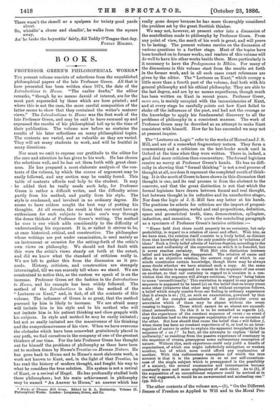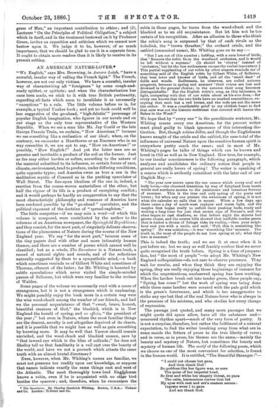BOOKS.
PROFESSOR GREEN'S PHILOSOPHICAL WORKS,
THE present volume consists of selections from the unpublished philosophical papers of the late Professor Green. All that is here presented has been written since 1874, the date of the Introductions to Hume. "The earlier drafts," the editor remarks, "though by no means devoid of interest, are for the most part superseded by those which are here printed ; and where this is not the case, the more careful composition of the latter seems to show that they contained the writer's maturer views." The Introductions to Hums was the first work of the late Professor Green, and may be said to have summed up and expressed the results of his philosophical toil up to the time of their publication. The volume now before us contains the results of his later reflections on many philosophical topics. The contents are varied, and as valuable as they are varied. They will set many students to work, and will be fruitful in many directions.
Nor must we omit to express our gratitude to the editor for the care and attention he has given to his work. He has chosen the selections well, and he has set them forth with great clear- ness. He has prepared a most elaborate analysis of the con- tents of the volume, by which the course of argument may be easily followed, and any section may be readily found. This table of contents affords real help to the student. It may • be added that he really needs such help, for Professor Green is rather a difficult writer, and the difficulty arises partly from his method, and partly from his style. The style is condensed, and involved in no ordinary degree. He seems to have seldom sought the best way of putting his thoughts. At all events, the result is that one must have an enthusiasm for such subjects to make one's way through the dense thickets of Professor Green's writing. The method he uses is one which adds considerably to the difficulty of understanding his argument. It is, or rather it strives to be, at once historical, critical, and constructive. The philosopher whose writings are put under examination, is used mainly as an instrument or occasion for the setting-forth of the critic's own views on philosophy. We should not find fault with this were the critic's views clearly set forth at the outset, and did we know what the standard of criticism really is. We are left to gather this from the discussion as it pro- ceeds. History, criticism, and construction are strangely intermingled, till we can scarcely tell where we stand. We are constrained to notice this, as the custom we speak of is on the increase. Professor Green set the fashion in the Introductions to Hume, and his example has been widely followed. The method of the Introductions is also the method of the " Lectures on Kant," and, in fact, of all the contents of this volume. The influence of Green is so great, that the method pursued by him is likely to increase. We are afraid many will imitate him in his style and in his method who will not imitate him in his patient thinking and close grapple with his subjects. In style and method he may be easily imitated ; but not so easily imitated are the massiveness of his thinking and the comprehensiveness of his view. When we have overcome the obstacles which have been somewhat gratuitously placed in our path, we find ourselves in the company of one of the greatest thinkers of our time. For the late Professor Green has thought out for himself the problems of philosophy as these have been set to modern times by Hume's Treatise on Human Nature. He has gone back to Hume and to Hume's most elaborate work, a work not known to Kant, and, in the light of that Treatise, he has read the history of modern thought, and fought his way to what he considers the true solution. His system is not a revival of Kant, or a revival of Hegel. He has profoundly studied both these philosophers ; but his main achievement in philosophy may be named "Au Answer to Hume," an answer which has • Works of Thomas am Green. Edited by a. L. Nettleship. Volume II. Philosophical Works. London : Longman, Green, and Co.
really gone deeper because he has more thoroughly considered the problem set by the great Scottish thinker.
We may not, however, at present enter into a discussion of the contribution made to philosophy by Professor Green. From any point of view, the merit of his work is great, and will prove to be lasting. The present volume carries on the discussion of various questions to a farther stage. Most of the topics have been touched on in former works, and readers of this volume will
do well to have his other works beside them. More particularly is it necessary to have the Prolegomena to Ethics. For many of the discussions in this volume start from the results set forth in the former work, and in all such cases exact references are given by the editor. The " Lectures on Kant," which occupy a little more than a fourth part of the volume, deal both with his
general philosophy and his ethical philosophy. They are able to the last degree, and are by no means superfluous, though much has been written on Kant in recent years. Professor Greer,
more suo, is mainly occupied with the inconsistencies of Kant, and at every stage he carefully points out how Kant failed to shake off the influences of the past, and had not the courage or the knowledge to apply his fundamental discovery to all the problems of philosophy in a consistent manner. The work of
Professor Green may be described as an attempt to make Kant consistent with himself. How far he has succeeded we may not at present inquire.
The "Lectures on Logic " refer to the works of Mansel and J. S. Mill, and are of a somewhat fragmentary nature. They form a commentary and a criticism on the text-books much used in Oxford at the time when they were written. There is, indeed, a good deal more criticism than commentary. The formal logicians receive no mercy at Professor Green's hands. He has no diffi- culty in showing that "formal thinking" is not a real process of thought at all, nordoes it represent the completed result of think- ing. It is the merit of Green to have shown in this discussion that thought is one, and its real process is from the abstract to the concrete, and that the great distinction is not that which the formal logicians have drawn between formal and real thought, but between thought in its reflective and its unreflective stages.
Nor does the logic of J. S. Mill fare any better at his hands. The positions he selects for criticism are the import of proposi- tions, names, categories, verbal and real propositions, definition, space and geometrical truth, time, demonstration, syllogism, induction, and causation. We q note the concluding paragraph as a specimen of Professor Green's incisive criticism :-
" Hume held that there could properly be no certainty, but only probability, in regard to a relation of cause and effect. With him, as we have seen, the relation itself consists in a lively belief, as distinct from that knowledge of which the only possible object is 'relations of ideas.' Such a lively belief admits of various degrees, according to the amount and uniformity of the experience on which it is founded, but it-never reaches certainty. With Mill this distinction between belief and knowledge has disappeared. The relation of cause and effect is an objective relation, the correct copy of which in our minds constitutes certain knowledge, though there may be always some doubt whether we have attained such a copy. At the same time, the relation is supposed to consist in the sequence of one event on another, so that our certainty in regard to it consists in a con- viction that the sequence will always continue, always' being taken to mean 'unconditionally.' This conviction in regard to any particular sequence is supposed to be based (a) on the belief that on every event some other (whatever that other may be) without exception follows, a belief which simply results from our finding in ordinary experience that it always is so ; (b), on such an examination, governed by that belief, of the complex antecedents of the particular event as ascertains which of them may be absent without the event ceasing to happen. Those which cannot be so absent are uncondi- tional antecedents. On this it is to be remarked as regards (a), that the experience of the constant sequence of event c on event d may doubtless lead to the strongest expectation of one on occasion of the other. But how should that cause the belief that e will follow f, when there has been no constant experience of it, or lead to an inter- rogation of nature in order to explain the apparent irregularity in the sequence of e on f In fact, all the attempts to explain belief in uniformity,' as resulting from the passive experience of constancy in the sequence of events, presuppose some rudimentary conception of nature. Without this, such experience could only yield a bundle of expectations, of which one might indefinitely strengthen or weaken another, but of which none could afford any explanation of another. With this rudimentary conception (of which the true account is that it is the presence in us as our self-conscious- ness of the single subject which is presupposed in the possibility of a nature), the several constancies and inconstancies become constantly more and more explanatory of each other. As to (b), if the supposition of an unconditional sequence could be arrived at in the way sugggested,• it would be an unwarranted and misleading one."
(pp. 305-6.)
The other contents of the volume are,—(1), " On the Different Senses of Freedom as Applied to Will and to the Moral Pro-
gross of Man," an important contribution to ethics ; and (2), Lectures " On the Principles of Political Obligation," a subject which in itself, and in the treatment bestowed on it'by Professor Green, invites an exposition and criticism which we cannot-now bestow upon it. We judge it to be, however; of so much importance, that we should be glad to see it in a separate form. It ought to obtain more readers than it is likely to receive in its present setting.



































 Previous page
Previous page